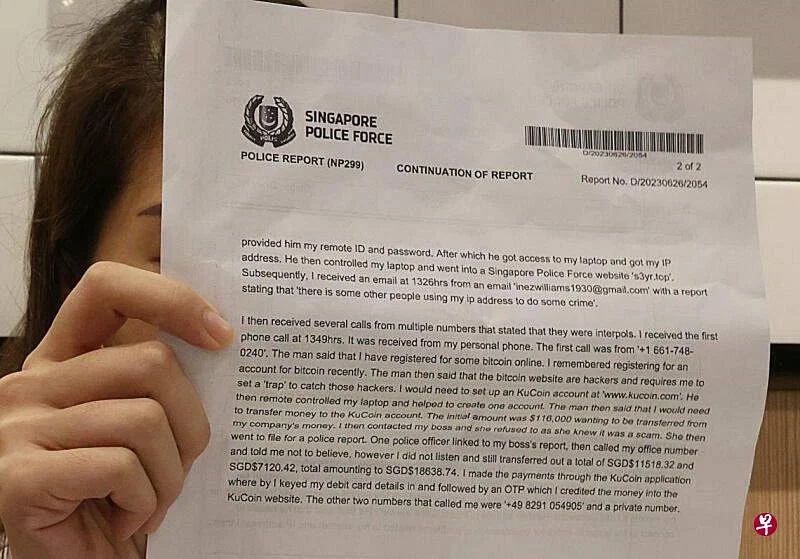Woman Allows Fake SingTel Employee To Remotely Access Her Computer, Was Told She’d Been Hacked
As scammers are becoming increasingly creative with their methods, people should be all the more vigilant when allowing strangers to access their devices.
Recently, a scammer reportedly posed as a fake SingTel employee to convince a woman to let them control her computer remotely.
The scammer even made a “police report” for her that forged the signature of Singapore’s Commissioner of Police.

Source: Mimi Thian on Unsplash. Photo for illustration purposes only.
The victim ended up losing S$18,000 through the scammer’s actions.
Fake SingTel employee calls woman at work on landline
The victim, named only as Ms Lee, told Shin Min Daily News that the scammer first contacted her at 1pm on Monday (26 June).
At the time, she was working at her job as a clerk in a construction company.
Unexpectedly, she received a call from someone claiming to be a SingTel employee on her office landline.
Fake SingTel employee says computer has network abnormality
The “SingTel employee” told Ms Lee that they’d detected a network abnormality on her computer.
They then convinced her to download and install “Ultra Viewer” — a program that lets another party control one’s computer remotely.
After “checking” her computer, they told Ms Lee that her Internet Protocol (IP) address had been fraudulently used, and asked her to make a police report.
‘Police report’ made had Police Commissioner’s Signature
The “SingTel employee” then opened up a “police website” to make a “police report” for her.
They then emailed her the “police report” and said the police would contact her later.
However, those who’ve made a police report before would know that the “police report” they sent her had a different format from real police reports — but it did have the “signature” of Singapore Police Commissioner Hoong Wee Teck.

Source: Shin Min Daily News
Besides that, it also had a “case number” that looked more like a tracking number for packages being delivered.
‘Police officer’ claims computer has been hacked
Barely 5 minutes after the fake SingTel employee hung up, Ms Lee received a call from someone who claimed to be a police officer.
The other party told her that her computer had been hacked and her personal info had been compromised.
As she’d opened an account with a virtual currency trading platform earlier but never traded on it, the hacker had gained access via the platform, the “police officer” said.

Source: Mika Baumeister on Unsplash. Photo for illustration purposes only.
They asked her to open an account with another virtual currency trading platform in order to “set a trap” for the hacker.
Scammer transfers S$18K from her account
Apparently, this “trap” involved “the police” transferring Ms Lee’s money into the virtual currency trading platform.
Saying that this was the only way to lure the hacker out, the scammer again used her computer to transfer S$12,000 out from her bank account.
They also transferred S$6,000 from her loan account, assuring her that they had the bank’s cooperation to make “fake transfers”.
She ended up not only losing all her savings but also owing the bank money.
Woman’s boss warned her about scam
Sadly, this scam could’ve been stopped — Ms Lee’s boss actually warned her that it could be a scam.
She had initially wanted to use the company’s bank account to transfer the money but her boss didn’t allow her to.
The boss even called the police to make a report, telling them that Ms Lee might be about to fall for a scam.
A real police officer then called Ms Lee to warn her about the possible scam.
However, the scammer over the phone persuaded her otherwise, saying that they were from Interpol and that her boss would be punished for failing to cooperate with them.
Eventually, Ms Lee allowed the scammer to transfer the money from her own bank account.
She finally made a real police report about the incident after realising she’d been scammed.

Source: Shin Min Daily News
Scammer spoke in Singapore-accented English
Ms Lee told Shin Min that the scammer was quite persuasive because he spoke in Singapore-accented English.
She’d encountered other attempted scams before but hadn’t fallen for them, she said, but had never heard of this particular scam before.
She was initially in disbelief that she’d fallen victim to a scam, but the realisation finally hit her when she saw her empty bank account, she added.
Have news you must share? Get in touch with us via email at news@mustsharenews.com.
Featured image adapted from Shin Min Daily News and Justin Ng on Flickr.







